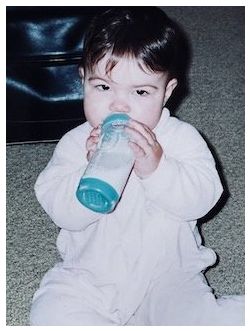A woman walks into a bar...
Just kidding. But this isn't a joke.
A former employee filed a lawsuit against the Michigan bar where she worked alleging that her employer did not provide her with time to pump milk at work for her baby.
Then, the employer fired her. Because of course they did.
The federal complaint alleges violations of the Providing Urgent Maternal Protections Act (PUMP Act), the 2023 law that protects workers who are breastfeeding and need time to pump at work.
What Happened In This Case?
In August 2023, the plaintiff, Ms. Jones, was a new mom.
She began working as a bartender and server at Glass House in Grand Rapids when her baby boy was five months old. She needed to pump about every two hours to keep producing enough milk for her baby, who she was nursing.
When she tells her manager she needs to pump, he (allegedly) says that he'll try to accommodate her but "no guarantees."
Finding nowhere to pump that wasn't in view of surveillance cameras or in a bathroom, Ms. Jones would leave work to pump at home.
Important point: she worked across the street from her house.
Ms. Jones claims that the bar did not provide her with space to pump, and management would not let her work certain shifts because of her need to pump.
Finally, fed up with her back and forth movements during shifts, management fired Ms. Jones in January 2024 claiming, allegedly, that she was not fast enough at her job.
What's This PUMP Act?
Employers, y'all need to know about this federal law.
As I told you about here, the PUMP Act, which amends the Fair Labor Standards Act ( FLSA), requires that employers provide reasonable break time to an employee for her to pump breast milk for the employee's nursing baby.
Nursing employees are entitled to break time to pump until their infant is one year old.

It also requires employers to provide a place, other than a bathroom, that is shielded from view and free from intrusion from coworkers and the public for the employee to pump.
This law requires a manager to do more than try to accommodate but "no guarantee."
And, like anti-discrimination statutes, the PUMP Act includes an anti-retaliation provision, which Ms. Jones and her counsel includes as a separate count in her federal complaint.
Yeah, I Get It, But What If There's Actually No Space? What If The Bar Is Packed?
Retail and hospitality employers, I hear you.
Restaurants and bars often boast a fast-paced environment with little time for breaks or additional space—let alone space free from intrusion or cameras.
Recognizing this tension between what the law requires and the practicalities of such workplaces, the U.S. Department of Labor recently published an on-demand webinar, presentation slides, and a frequently-asked-questions (FAQ) publication for the retail and restaurant industries.
If the bar in this case checked the DOL's guidance, it would know it had options:
- The PUMP Act does not require an employer to create permanent space for a nursing mom to pump but can temporarily designate a space or make one available when needed by the employee to pump. Perhaps Ms. Jones's manager could have allowed her to pump in his office when she needed and lock the door.
- An employer may be able to create temporary space for pumping by providing dividers and signs in a storage room or part of one.
- A restaurant employer can allow the employee to block or turn off cameras to ensure the space is shielded from view and free from intrusion.
Employers may have to get creative about space to accommodate employees—the PUMP Act is law.
Employer Takeaway
While this is one of the first PUMP Act cases in Michigan, it won't be the last.
Employers should consult counsel to understand the scope of their obligations under this law and the Pregnant Workers Fairness Act (PWFA) and to update their policies.
And, of course, do not retaliate against nursing employees by terminating them because of the time it takes them to pump milk for their babies.
The content of this article is intended to provide a general guide to the subject matter. Specialist advice should be sought about your specific circumstances.
